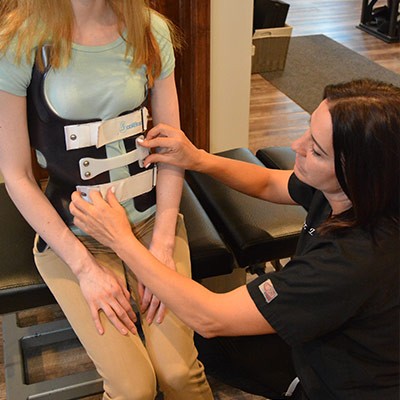Scoliosis, a condition characterized by an abnormal curvature of the spine, affects millions of people worldwide. While it is often associated with the physical appearance of a curved back, the effects of scoliosis go far beyond aesthetics.
In this blog post, we will delve into the various aspects of this condition, exploring its physical, emotional, and social consequences. By gaining a deeper understanding of the effects of scoliosis, we can better appreciate the challenges faced by those living with it and the importance of early detection and treatment.
1. The physical effects of scoliosis
At its core, scoliosis is a condition that affects the physical alignment of the spine. Here are some of the key physical effects:
- Spinal deformity – The most obvious effect of scoliosis is the abnormal curvature of the spine. When left untreated, this curvature can become more pronounced, leading to a visible deformity.
- Pain and discomfort – As your spine curves more, the back pain gets worse and can make everyday activities harder. The good news is, if you’re in Oklahoma City, there are back pain relief treatments to help with this pain. By seeing a specialist who knows about scoliosis, you can learn ways to manage the pain and make life better.
- Restricted mobility – In severe cases, scoliosis can limit a person’s range of motion. Simple tasks like bending, twisting, or lifting objects may become challenging.
- Breathing difficulties – When scoliosis affects the chest cavity, it can lead to reduced lung capacity and breathing difficulties. This can impact a person’s stamina and ability to engage in physical activities.
- Digestive issues – The altered position of the spine and ribcage can affect the alignment of internal organs, potentially leading to digestive problems.
- Neurological symptoms – In rare instances, scoliosis may put pressure on nerves, resulting in symptoms such as numbness, tingling, or weakness in the arms or legs.
It’s important to note that the severity of these physical effects can vary widely among individuals with scoliosis. Early diagnosis and appropriate treatment can help manage these symptoms and prevent them from worsening.
2. The emotional toll of scoliosis
Living with scoliosis can take an emotional toll on individuals, particularly during adolescence. Here are some of the emotional effects:
- Self-esteem and body image issues – Adolescents with scoliosis may struggle with body image concerns. The visible curvature of the spine can lead to a negative self-image and a decrease in self-esteem.
- Psychological impact – Managing the physical discomfort and limitations caused by scoliosis can be emotionally challenging. Many individuals with scoliosis experience anxiety, depression, or feelings of frustration.
- Social isolation – Some people with scoliosis may withdraw from social activities or feel isolated due to their condition. They may fear judgment or discrimination from peers.
- Bullying and teasing – Unfortunately, scoliosis can make individuals targets for bullying or teasing, further exacerbating their emotional distress.
Support from friends, family, and mental health professionals is crucial in addressing the emotional impact of scoliosis. Encouraging open communication and fostering a positive body image can also help individuals cope with these challenges.
3. Social and lifestyle implications
Scoliosis can have a range of social and lifestyle implications:
- Limited participation in physical activities – Depending on the severity of scoliosis, individuals may be limited in their ability to participate in physical activities and sports, which can affect their overall well-being.
- Financial costs – Treatment for scoliosis, especially surgical intervention, can be costly, and this financial burden can add stress to individuals and their families.
- Educational challenges – Adolescents with scoliosis may experience difficulties sitting for extended periods, which can affect their performance in school. It’s essential to provide accommodations and support to help them succeed academically.
Conclusion
Scoliosis is more than just a physical curvature of the spine. It has wide-ranging effects on an individual’s physical health, emotional well-being, and social life. Understanding these effects is crucial for providing appropriate support and care to those living with scoliosis.
Early detection and intervention can play a significant role in managing the physical symptoms and preventing the condition from worsening. Additionally, addressing the emotional and social aspects of scoliosis, such as self-esteem, body image, and social support, can greatly improve the quality of life for individuals with this condition.
Ultimately, by raising awareness of the multifaceted effects of scoliosis, we can foster a more compassionate and inclusive society that provides the necessary support for those facing this challenging condition.
